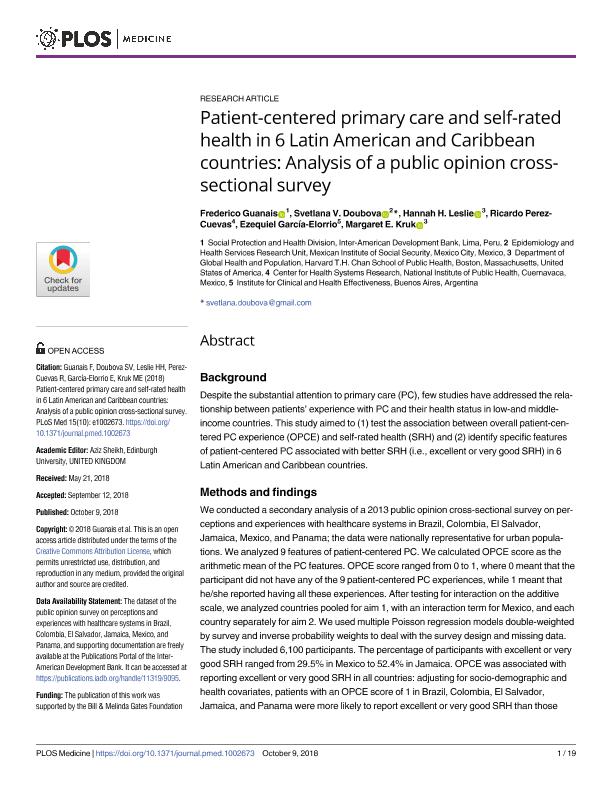Mostrar el registro sencillo del ítem
dc.contributor.author
Guanais, Frederico
dc.contributor.author
Doubova, Svetlana V.
dc.contributor.author
Leslie, Hannah H.
dc.contributor.author
Perez Cuevas, Ricardo
dc.contributor.author
Garcia Elorrio, Ezequiel

dc.contributor.author
Kruk, Margaret E.
dc.date.available
2020-02-20T21:24:20Z
dc.date.issued
2018-10
dc.identifier.citation
Guanais, Frederico; Doubova, Svetlana V.; Leslie, Hannah H.; Perez Cuevas, Ricardo; Garcia Elorrio, Ezequiel; et al.; Patient-centered primary care and self-rated health in 6 Latin American and Caribbean countries: Analysis of a public opinion cross-sectional survey; Public Library of Science; Plos Medicine; 15; 10; 10-2018; 1-19
dc.identifier.issn
1549-1277
dc.identifier.uri
http://hdl.handle.net/11336/98212
dc.description.abstract
Background: Despite the substantial attention to primary care (PC), few studies have addressed the relationship between patients’ experience with PC and their health status in low-and middle-income countries. This study aimed to (1) test the association between overall patient-centered PC experience (OPCE) and self-rated health (SRH) and (2) identify specific features of patient-centered PC associated with better SRH (i.e., excellent or very good SRH) in 6 Latin American and Caribbean countries. Methods and findings: We conducted a secondary analysis of a 2013 public opinion cross-sectional survey on perceptions and experiences with healthcare systems in Brazil, Colombia, El Salvador, Jamaica, Mexico, and Panama; the data were nationally representative for urban populations. We analyzed 9 features of patient-centered PC. We calculated OPCE score as the arithmetic mean of the PC features. OPCE score ranged from 0 to 1, where 0 meant that the participant did not have any of the 9 patient-centered PC experiences, while 1 meant that he/she reported having all these experiences. After testing for interaction on the additive scale, we analyzed countries pooled for aim 1, with an interaction term for Mexico, and each country separately for aim 2. We used multiple Poisson regression models double-weighted by survey and inverse probability weights to deal with the survey design and missing data. The study included 6,100 participants. The percentage of participants with excellent or very good SRH ranged from 29.5% in Mexico to 52.4% in Jamaica. OPCE was associated with reporting excellent or very good SRH in all countries: adjusting for socio-demographic and health covariates, patients with an OPCE score of 1 in Brazil, Colombia, El Salvador, Jamaica, and Panama were more likely to report excellent or very good SRH than those with a score of 0 (adjusted prevalence ratio [aPR] 1.61, 95% CI 1.37–1.90, p < 0.001); in Mexico, this association was even stronger (aPR 4.27, 95% CI 2.34–7.81, p < 0.001). The specific features of patient-centered PC associated with better SRH differed by country. The perception that PC providers solve most health problems was associated with excellent or very good SRH in Colombia (aPR 1.38, 95% CI 1.01–1.91, p = 0.046) and Jamaica (aPR 1.21, 95% CI 1.02–1.43, p = 0.030). Having a provider who knows relevant medical history was positively associated with better SRH in Mexico (aPR 1.47, 95% CI 1.03–2.12, p = 0.036) but was negatively associated with better SRH in Brazil (aPR 0.71, 95% CI 0.56–0.89, p = 0.003). Finally, easy contact with PC facility (Mexico: aPR 1.35, 95% CI 1.04–1.74, p = 0.023), coordination of care (Mexico: aPR 1.53, 95% CI 1.19–1.98, p = 0.001), and opportunity to ask questions (Brazil: aPR 1.42, 95% CI 1.11–1.83, p = 0.006) were each associated with better SRH. The main study limitation consists in the analysis being of cross-sectional data, which does not allow making causal inferences or identifying the direction of the association between the variables. Conclusions: Overall, a higher OPCE score was associated with better SRH in these 6 Latin American and Caribbean countries; associations between specific characteristics of patient-centered PC and SRH differed by country. The findings underscore the importance of high-quality, patient-centered PC as a path to improved population health.
dc.format
application/pdf
dc.language.iso
eng
dc.publisher
Public Library of Science

dc.rights
info:eu-repo/semantics/openAccess
dc.rights.uri
https://creativecommons.org/licenses/by/2.5/ar/
dc.subject
SELF-RATED HEALTH
dc.subject
CROSS-SECTIONAL
dc.subject.classification
Otras Ciencias de la Salud

dc.subject.classification
Ciencias de la Salud

dc.subject.classification
CIENCIAS MÉDICAS Y DE LA SALUD

dc.title
Patient-centered primary care and self-rated health in 6 Latin American and Caribbean countries: Analysis of a public opinion cross-sectional survey
dc.type
info:eu-repo/semantics/article
dc.type
info:ar-repo/semantics/artículo
dc.type
info:eu-repo/semantics/publishedVersion
dc.date.updated
2020-02-18T16:01:05Z
dc.journal.volume
15
dc.journal.number
10
dc.journal.pagination
1-19
dc.journal.pais
Estados Unidos

dc.journal.ciudad
San Francisco
dc.description.fil
Fil: Guanais, Frederico. Banco Interamericano de Desarrollo. División de Protección Social y Salud; Perú
dc.description.fil
Fil: Doubova, Svetlana V.. Instituto Mexicano del Seguro Social; México
dc.description.fil
Fil: Leslie, Hannah H.. Harvard University. Harvard School of Public Health; Estados Unidos
dc.description.fil
Fil: Perez Cuevas, Ricardo. Instituto Nacional de Salud Pública; México
dc.description.fil
Fil: Garcia Elorrio, Ezequiel. Instituto de Efectividad Clínica y Sanitaria; Argentina. Consejo Nacional de Investigaciones Científicas y Técnicas; Argentina
dc.description.fil
Fil: Kruk, Margaret E.. Harvard University. Harvard School of Public Health; Estados Unidos
dc.journal.title
Plos Medicine

dc.relation.alternativeid
info:eu-repo/semantics/altIdentifier/url/https://www.ncbi.nlm.nih.gov/pmc/articles/PMC6177127/
dc.relation.alternativeid
info:eu-repo/semantics/altIdentifier/doi/http://dx.doi.org/10.1371/journal.pmed.1002673
dc.relation.alternativeid
info:eu-repo/semantics/altIdentifier/url/https://journals.plos.org/plosmedicine/article?id=10.1371/journal.pmed.1002673
Archivos asociados
